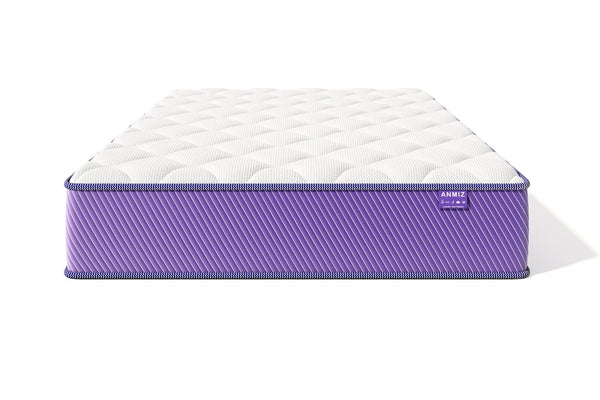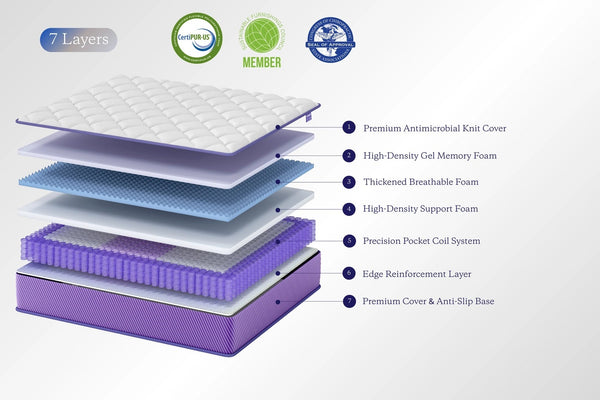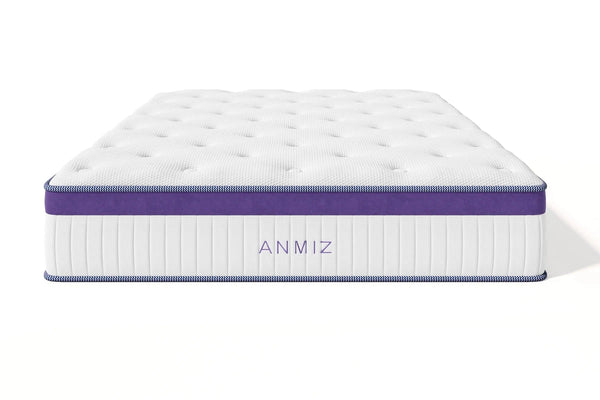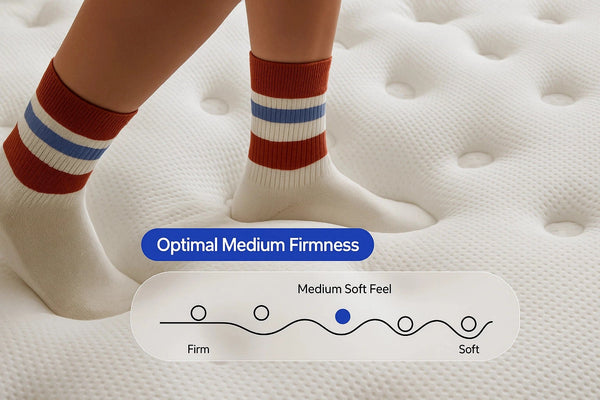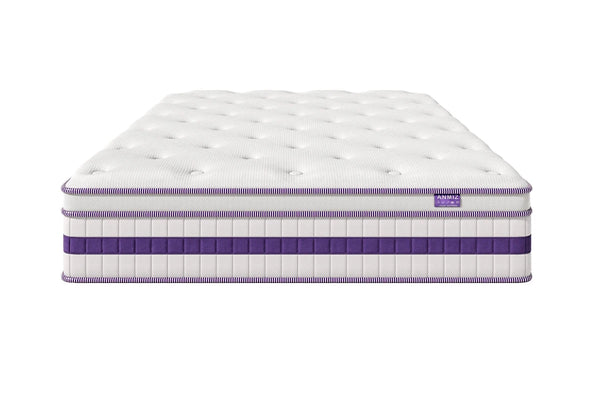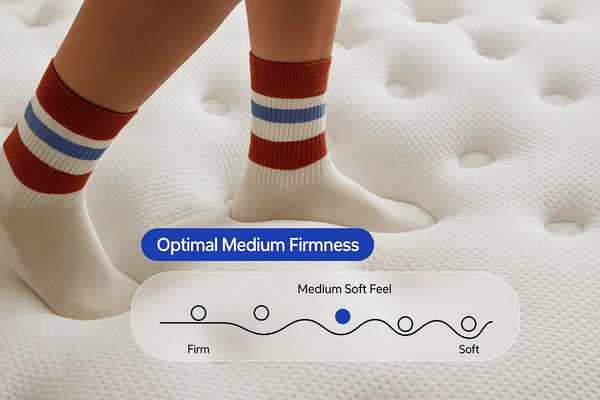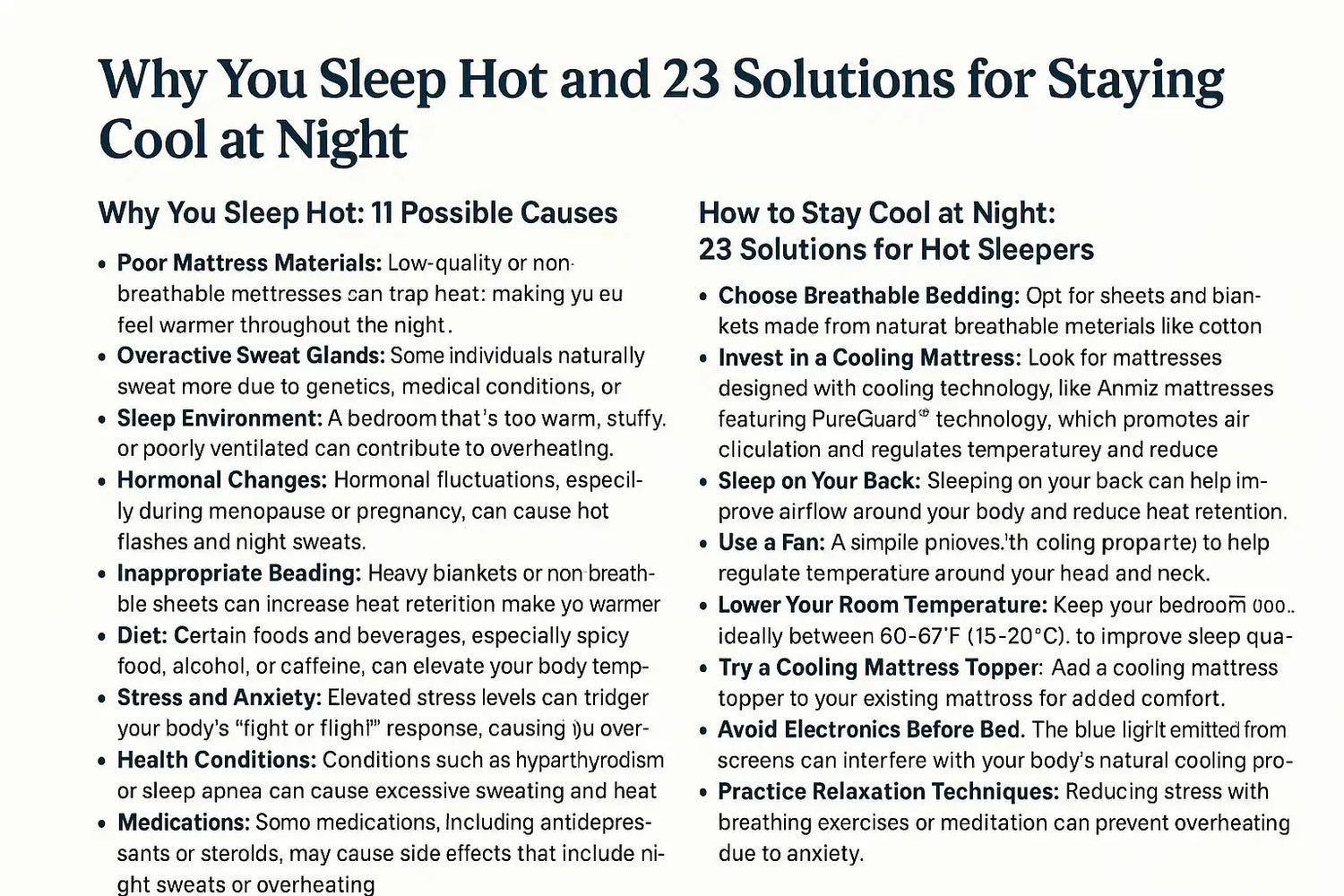
If you find yourself tossing and turning at night due to the heat, you’re not alone. Many people struggle with sleeping hot, whether it’s due to environmental factors, hormonal changes, or certain health conditions. The good news is that there are plenty of solutions to help you stay cool and comfortable throughout the night. In this blog, we’ll explore the common causes of sleeping hot and share 23 practical tips to help you beat the heat and enjoy a restful, cool sleep. From adjusting your sleep environment to choosing the right bedding and sleepwear, we’ve got you covered.
Why You Sleep Hot: 11 Possible Causes

If you’re waking up sweating or tossing and turning due to heat, you're not alone. Many people experience uncomfortable heat during sleep, and several factors could be at play. Here are 11 common reasons why you sleep hot:
- Poor Mattress Materials: Low-quality or non-breathable mattresses can trap heat, making you feel warmer throughout the night.
- Overactive Sweat Glands: Some individuals naturally sweat more due to genetics, medical conditions, or lifestyle.
- Sleep Environment: A bedroom that’s too warm, stuffy, or poorly ventilated can contribute to overheating.
- Hormonal Changes: Hormonal fluctuations, especially during menopause or pregnancy, can cause hot flashes and night sweats.
- Inappropriate Bedding: Heavy blankets or non-breathable sheets can increase heat retention and make you feel warmer.
- Diet: Certain foods and beverages, especially spicy food, alcohol, or caffeine, can elevate your body temperature.
- Stress and Anxiety: Elevated stress levels can trigger your body’s “fight or flight” response, causing you to overheat.
- Health Conditions: Conditions such as hyperthyroidism or sleep apnea can cause excessive sweating and heat during sleep.
- Medications: Some medications, including antidepressants or steroids, may cause side effects that include night sweats or overheating.
- Overactive Metabolism: Some people have a naturally higher metabolism, leading to higher body temperatures at night.
- Improper Sleepwear: Wearing tight or non-breathable clothing to bed can trap heat and cause discomfort.
How to Stay Cool at Night: 23 Solutions for Hot Sleepers
Now that we know some common causes of sleeping hot, here are 23 tips to help you stay cool and comfortable throughout the night:
- Choose Breathable Bedding: Opt for sheets and blankets made from natural, breathable materials like cotton or linen.
- Invest in a Cooling Mattress: Look for mattresses designed with cooling technology, like Anmiz mattresses featuring PureGuard™ technology, which promotes air circulation and regulates temperature.
- Sleep on Your Back: Sleeping on your back can help improve airflow around your body and reduce heat retention.
- Use a Fan: A simple fan can help circulate air in the room and create a cooling breeze.
- Open a Window: Allow cool air to enter your bedroom by opening a window, especially during the night.
- Take a Cool Shower Before Bed: A cool shower can lower your body temperature and help you feel more comfortable.
- Wear Light, Moisture-Wicking Pajamas: Choose light and breathable sleepwear made from materials that wick moisture away from your skin.
- Stay Hydrated: Drink plenty of water throughout the day and keep a glass of water by your bedside to stay cool during the night.
- Use a Cooling Pillow: Invest in pillows with cooling properties to help regulate temperature around your head and neck.
- Lower Your Room Temperature: Keep your bedroom cool, ideally between 60-67°F (15-20°C), to improve sleep quality.
- Try a Cooling Mattress Topper: Add a cooling mattress topper to your existing mattress for added comfort and temperature regulation.
- Limit Alcohol and Caffeine: Avoid consuming alcohol or caffeine in the evening, as these can raise your body temperature.
- Avoid Spicy Foods: Eating spicy foods before bed can increase body heat and trigger night sweats.
- Opt for Natural Fibers in Your Sleepwear: Materials like cotton or silk allow for better airflow and reduce heat retention.
- Use Essential Oils: Cooling oils like peppermint or eucalyptus can help lower body temperature and promote relaxation.
- Try Sleep-Inducing Teas: Herbal teas such as chamomile or peppermint can help lower your body temperature and prepare you for sleep.
- Use a Cooling Mattress Protector: A breathable mattress protector can help regulate the heat trapped by your mattress.
- Avoid Electronics Before Bed: The blue light emitted from screens can interfere with your body’s natural cooling process.
- Practice Relaxation Techniques: Reducing stress with breathing exercises or meditation can prevent overheating due to anxiety.
- Sleep with Your Feet Exposed: Keeping your feet uncovered can help regulate your body temperature by allowing heat to escape.
- Sleep in a Reclined Position: If you’re prone to heat, sleeping at a slight incline can help promote airflow and reduce heat buildup.
- Try Cold Packs: Applying cold packs or ice packs to your wrists, neck, or feet can help cool down your body quickly.
- Consider Smart Sleep Technology: Use smart devices that monitor your sleep environment and adjust the temperature as needed.
Suggested Table:
| Cause of Sleeping Hot | Solution |
| Poor Mattress Materials | Invest in cooling mattresses with PureGuard™ technology. |
| Overactive Sweat Glands | Wear breathable, moisture-wicking sleepwear. |
| Hormonal Changes | Try herbal teas and stay hydrated. |
| Inappropriate Bedding | Opt for cotton or linen sheets and blankets. |
| Diet | Avoid spicy food, caffeine, and alcohol before bed. |
| Stress and Anxiety | Practice relaxation techniques like deep breathing. |
| Health Conditions | Use cooling pillows and invest in a breathable mattress. |
| Medications | Consult your doctor if medications are affecting sleep temperature. |
| Improper Sleepwear | Wear lightweight, moisture-wicking sleepwear. |
| Overactive Metabolism | Lower room temperature and sleep on a cooling mattress. |







